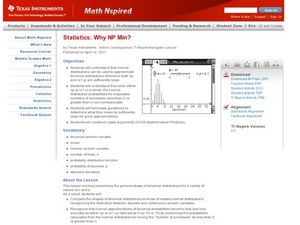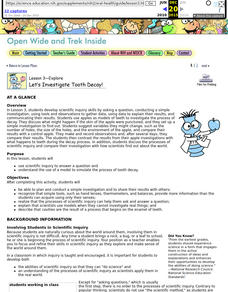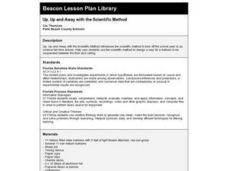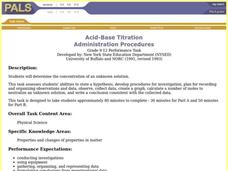Curated OER
Enhancing Uptake of Glucose in Rabbit Muscle Cells
Students observe diffusion of glucose through a cell membrane and research the function of chromium picolinate in glucose uptake into a cell. They conclude and understand the role of insulin and chromium picolinate in the uptake of...
Curated OER
Using the Scientific Method
Students practice using the scientific method. For this scientific processes lesson, students read and discuss the main parts of the scientific method. Students plan how they would conduct an experiment using the scientific method.
Curated OER
Assessing Normalcy
Learners define normal distribution as it relates to the bell curve. In this statistics lesson plan, students use the central tendencies of mean, median and mode to solve problems. They plot their data and draw conclusion from the graphs.
Curated OER
Why NP Min?
Students calculate the normal distribution. In this statistics lesson plan, students use the normal distribution to estimate binomial distributions. They define when to use NP and n(1-p) to make approximations.
Curated OER
Upside-Down Wings
Young scholars use FoilSim to demonstrate that the graphic analysis of the airflow around one object can be used to hypothesize airflow graphs for objects as they are elongated from a sphere to an airfoil shape.
Curated OER
Design of Airfoil for Given Lift
Students use FoilSim to design an airplane wing that generates a given lift. As they change parameters such as airspeed, altitude, angle of attack, thickness and curvature of the airfoil, and size of the wing area, the software...
Curated OER
Lift Relationships
Young scholars use FoilSim (downloadable) to determine how lift is affected by varying parameters on the Airfoil simulation.
Curated OER
Actual Airflow vs. Ideal Airflow: Stalls
Students use 3-D modeling techniques to observe the characteristic signature of the stall condition apparent on an airfoil at high angles of attack. They use FoilSim to compare the above with ideal airflow.
Curated OER
Aerodynamics
Students discover the basic principles of aerodynamics, including the roles and identity of natural forces involved. They examine how the force of gravity is overcome by the curved shape of an airplane wing and air pressure.
Curated OER
Let's Investigate Tooth Decay
Students conduct a simple investigation to explore tooth decay.
Curated OER
CAN'T TOUCH THIS!
Students discover the best practical shielding material when dealing with radioactive substances. They draw conclusions based on availability of materials, price, and best shielding properties.
Curated OER
Bird Populations
Students gather data about bird populations. They study bird migratory patterns using the methods that researchers use. They write an essay explaining the differences between the four types of population movements.
Curated OER
Land Safely...
Young scholars model the preparation needed for a soft-landing on a planet or object in space. They do this by packaging a raw egg with certain material, and dropping the egg from a given height to test the packaging effectiveness.
Curated OER
Up, Up and Away with the Scientific Method
Students utilize the scientific method to design a way for a balloon to be suspended between the floor and the ceiling.
Curated OER
Reading Trees: Understanding Dendrochronology
Students examine tree-ring dating and discuss the lack of water the settlers in Jamestown faced. They create paper tree rings, simulate rain patterns, and describe the history of construction paper tree sequences.
Curated OER
Building a Pill Bug Palace
Students make "pets" of isopods (potato bugs) to determine their preferred environment and food sources. They record their results on a bar graph and in a scientific report.
Curated OER
Unfold the Mystery of Mold
Young scholars research the conditions in which molds thrive. They apply the scientific method to develop a hypothesis, conduct research and test results.
Curated OER
Building Tetrahedral Kites
Young scholars work together to build tetrahedral kites. They must follow directions and the provided materials. They discover the engineering concepts needed to make the kite.
Curated OER
Keep the Environment Clean
Students discuss ways our environment becomes polluted. They make a list of ways to keep it clean.
Curated OER
Meteorology (Condensation)
Second graders define condensation and evaporation. They identify and describe the steps in the water cycle. They ask questions to end the lesson.
Curated OER
Predicting: Making a Hypothesis
Students analyze information from various sources to create a hypothesis about the origin of a family artifact. Students create a hypothesis about the origin of the item and write a paragraph explaining why they believe the hypothesis is...
Curated OER
An Egg-cellent Osmosis Experiment
Learners investigate the problem of osmosis by conducting an experiment. They use eggs with the shells dissolved to tell whether fluid can move across the membranes. The experiment provides high interest for all kinds of students to keep...
Curated OER
Acid-Base Titration
High schoolers determine the concentration of an unknown solution. This task assesses students' abilities to state hypothesis, develop procedures for investigation, plan for recording and organizing observations and data, collect data,...
Curated OER
Electric Circuits
High schoolers determine the power dissipated in the combination of two resistors connected in series to a 6 volt battery. This task assesses students' abilities to develop procedures for an investigation, develop a plan for recording...

























